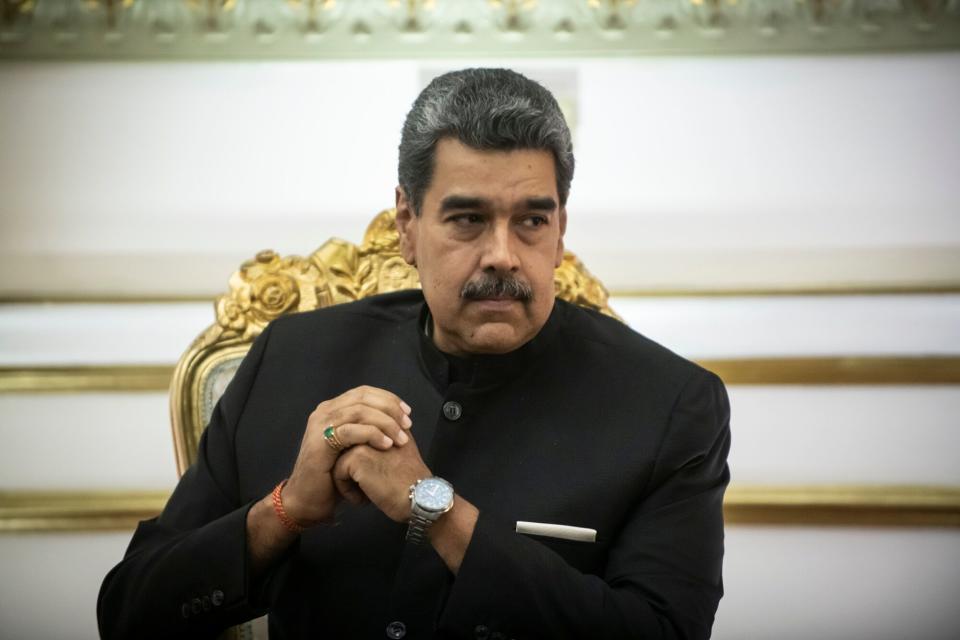Venezuela Watchers Say Maduro Will Seek to Evade Latest Sanctions

(Bloomberg) -- Venezuelan activists and policy analysts are calling for tougher sanctions and investigations into how President Nicolás Maduro’s government is using cryptocurrencies to get around international restrictions.
Most Read from Bloomberg
Flesh-Eating Bacteria That Can Kill in Two Days Spreads in Japan
How the US Mopped Up a Third of Global Capital Flows Since Covid
These Are the World’s Most Expensive Cities for Expats in 2024
Ukraine Bid for Global South Support Falters at Swiss Summit
Danes Asked to Keep Supplies, Iodine Pills to Prepare for Crises
The US reinstated gold and oil sanctions on May 31 after Maduro failed to honor an agreement to allow a fairer vote in elections scheduled for July. The US has imposed targeted sanctions on Venezuelan individuals and entities for almost two decades.
“When you’re talking about regimes that are subject to sanctions, they’re typically going to look for a variety of ways to evade those sanctions,” said Andrew Fierman, head of national security intelligence at blockchain data firm Chainalysis Inc. and a contributor to a recent report from the Woodrow Wilson International Center for Scholars, a policy research group in Washington. “The Venezuelan government and the Maduro regime have been doing this across a wide array of methods over the years.”
Venezuelan dissident Leopoldo López and Chainalysis’s director of Intel Solutions, Kristofer Doucette, the co-authors of the April report, wrote that there is a big gap in the latest round of sanctions, especially when the Maduro regime has stated that sanctions violations have been a goal of its cryptocurrency projects.
The Venezuelan government is no stranger to cryptocurrencies, releasing their own token called the Petro in 2018. The token, backed by the country’s oil and mineral reserves, was touted as an alternative to the Venezuelan bolívar in the face of hyperinflation and as a tool to bypass crippling US sanctions. While the government forced financial institutions to present balances in both bolívares and Petros, the token was mostly of symbolic value and had very little usability for the average Venezuelan.
The government halted the use of the token in January after opening an investigation into a large corruption in which crypto wallets were allegedly used to redirect payments owed to the state-run oil company Petróleos de Venezuela SA.
“Every dollar misappropriated by the Maduro regime rightfully belongs to the Venezuelan people,” López and Doucette wrote. “The billions that have vanished in recent years represent a grotesque sum, which could have been pivotal in revitalizing the country’s faltering economy. Instead, Maduro’s embrace of cryptocurrency exploited an emerging technology to carve out a new pathway for diverting the nation’s riches, further impoverishing its citizens.”
In the report, López and Doucette call for more thorough and stricter sanctions from the US and European Union, and for more countries to investigate the use of cryptocurrencies by the government to evade sanctions.
A blockchain examination by Chainalysis showed that SUNACRIP — the National Superintendency of Crypto Assets and Related Activities, by its acronym in Spanish — was regularly transferring significant amounts of the tokens across multiple accounts within various cryptocurrency services. The blockchain traced to a number of addresses potentially managed by SUNACRIP or an individual close to the organization that processed more than $70 million in various stablecoins used to streamline transactions.
In a response to request for more data about seized operations by the US in transactions where the Venezuelan government used cryptocurrencies to evade sanctions, Chainalysis said, “at this time, we don’t have data to share on the number of seized crypto transactions that have been linked to the Venezuelan government.”
Most Read from Bloomberg Businessweek
Grieving Families Blame Panera’s Charged Lemonade for Leaving a Deadly Legacy
Trump’s Planned Tariffs Would Tax US Households, Economists Warn
Google DeepMind Shifts From Research Lab to AI Product Factory
©2024 Bloomberg L.P.
